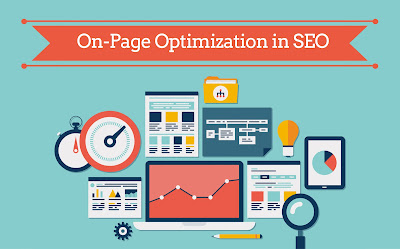On page Optimization
In the search engine
optimization, on-page optimization refers to factors that have an effect on
the Web site or Web page listing in a search results. Onpage optimization refers
to all measures that can be taken directly within the website in order to
improve its position in the search rankings. These factors are
controlled by you or by coding on your page. Examples of on-page optimization include
actual HTML code, meta tags, keyword placement and keyword density.
Head section optimization
Head section optimization
mainly focuses on the snippet and it includes seo title, url, and
meta description.
Snippet can make more attractive by using the star
rating is termed as rich snippet.
Define the title of your web
page or document. They’re mostly used to display preview snippets of our web
pages. When we are writing our title tag, it should be always short,
clear and does not contain but duplicate content from the page
content.
Title
The ideal length of a title
should 50 – 60 characters or 512 pixel. If our title tag
exceed 60 characters, Google will only show the first 60 characters.Google
cannot display long sentences which have more than 512 pixel width ,When
it exceed more than 60 characters, The google should display the search
result as
The title tag represents the
whole content of your webpage. So we must care about these things,
the things we should take care of are, there should not be spelling mistakes, No
grammatical errors, Title should be bold. The title must be clear and impressive, Never use the same title to all your
web pages, that means the title should be unique
URL
A URL is mainly used to point webpage, a component of a
webpage or a program on a website. The resource name consists of:
·
A program name or a path to the file on the server.
Meta description
Meta description is a
short description about the web services and focusing ares also an important
one. We cannot avoid it and if we does not give meta description, The
google automaticaly take the contain as meta description.
So we must care about these
things
·
Short description.
·
Limit with in 20 words.
·
Unic
For a page the
meta description should be in 155 to 160, That is pixel width of 1024.
Body section optimization
H1, H2, H3, H4, H5, H6 are the
body tags. H1 tag is the identity part of body section. H1 tag are
generally used for main heading. 8 words can be used in H1 tag. If the H1
is not specified, google take heading from H2 tag. The important part of
body section is H1.
Sandbox
Sandbox is temporary storage
space. In computer security, a sandbox is a security
mechanism for separating running programs, usually in an effort to mitigate
system failures or software vulnerabilities from spreading. It is often used to
execute untested or untrusted programs or code, possibly from unverified or
untrusted third parties, suppliers, users or websites, without risking harm to
the host machine or operating system..
Content optimization
Content is the most
descriptive part of the website. Content can be a text, link,
images or any other things. The main part or visible part of content is anchor
text which is hyperlink added to the text. Hyperlink can act as a
link. So focused keyword should not be used as anchor text.
Rules which be followed
content is writing are
·
Starting sentence can be include focusing keyword.
·
Use simple sentences upto 20 words.
·
Put space before full stop and comma.
Keyword Density
The keyword density which
specify the number of keywords appears on that page compared to the total
number of words on that page. 2-5% is the normal way and keyword
density depends upon the length of the content.


No comments:
Post a Comment